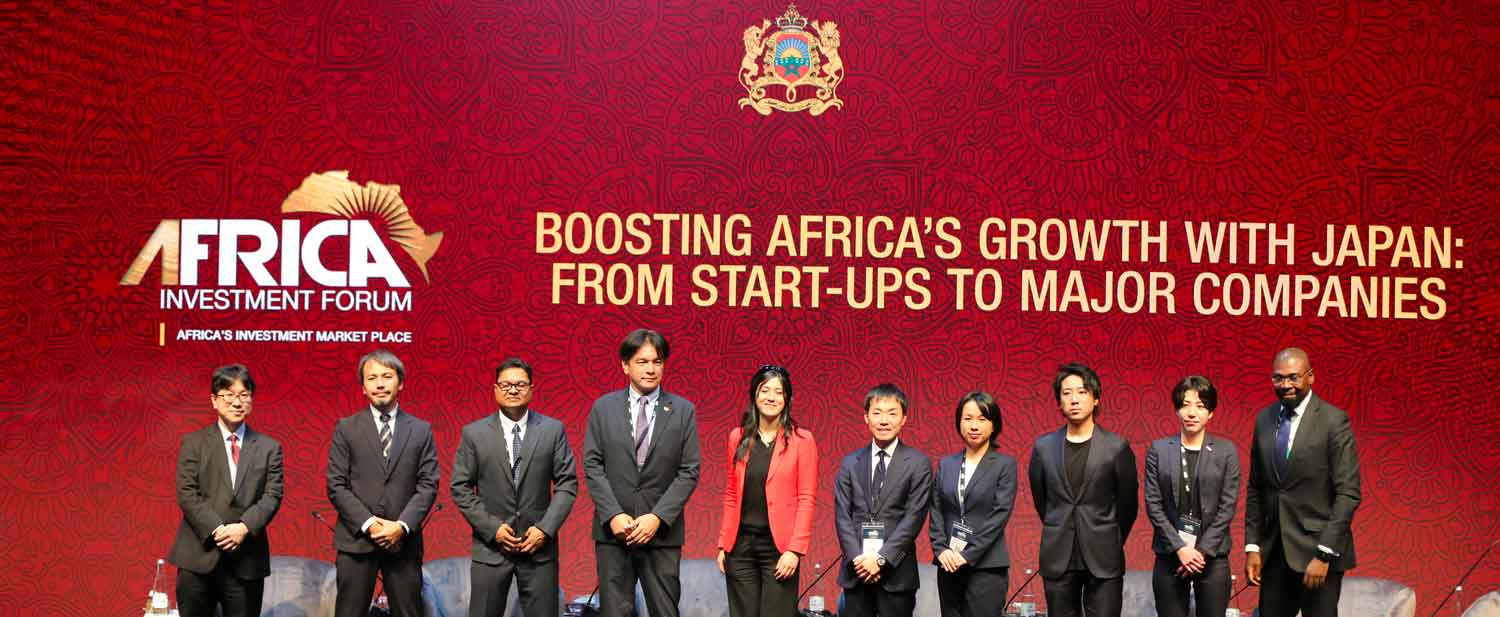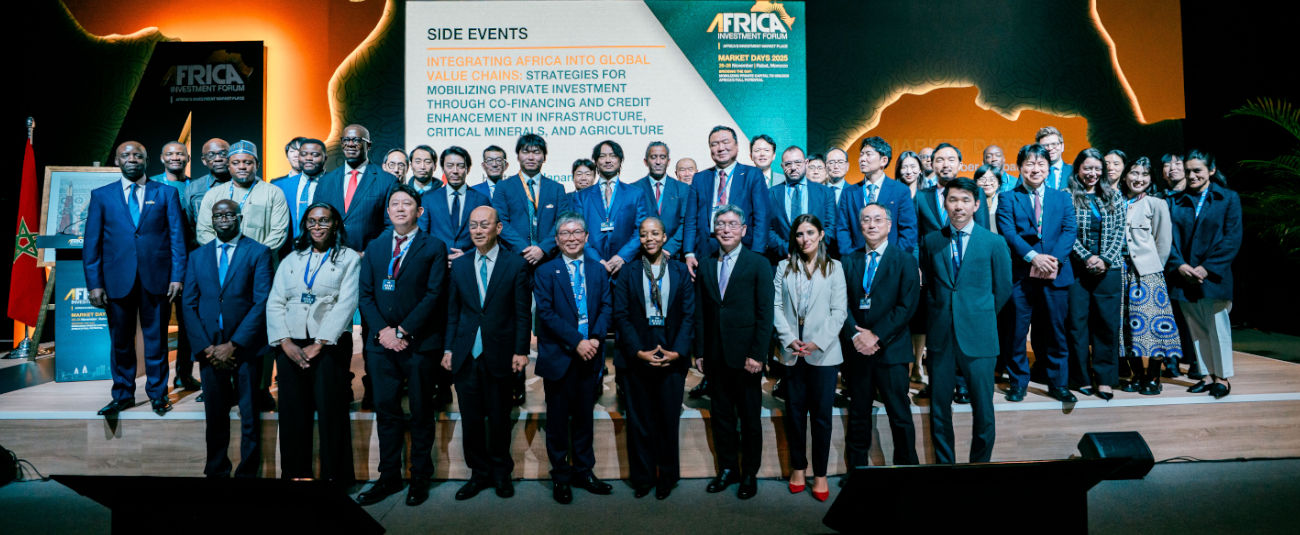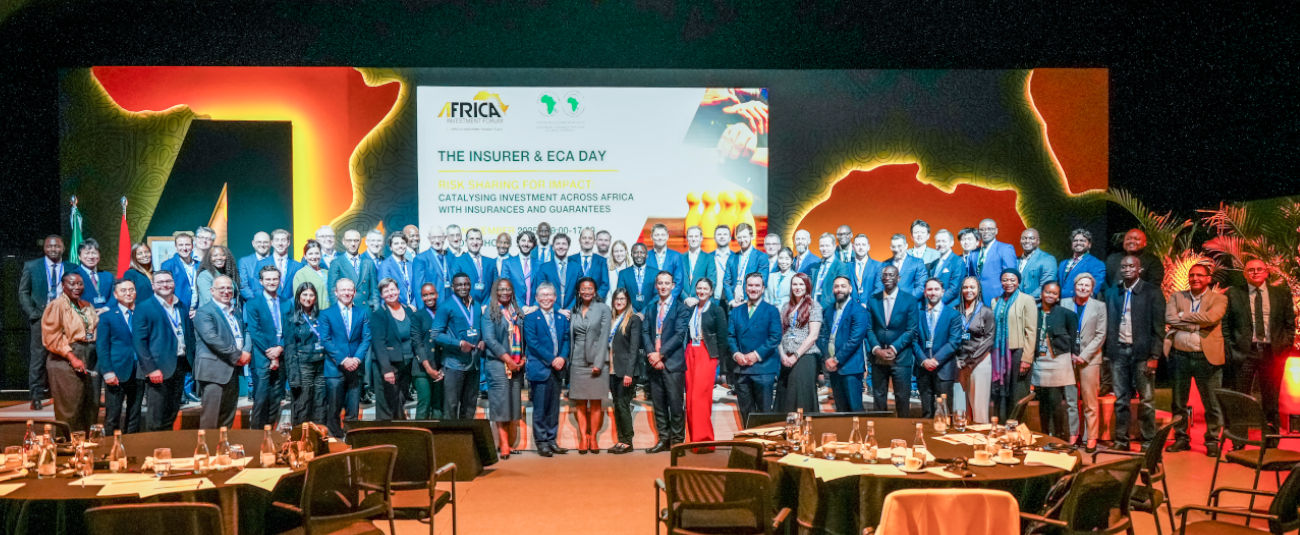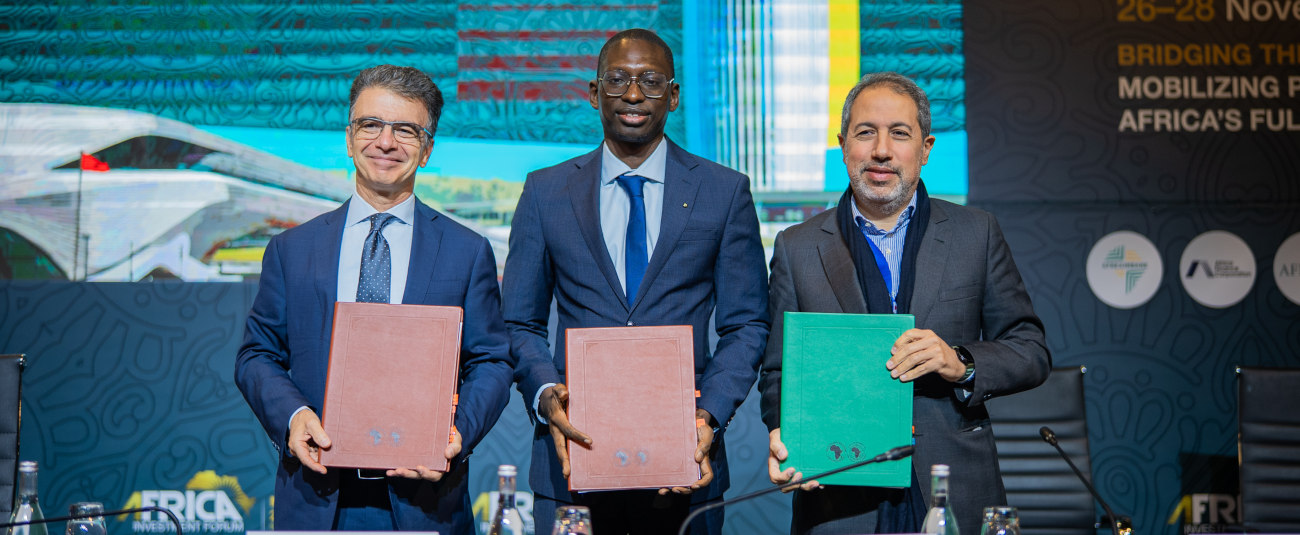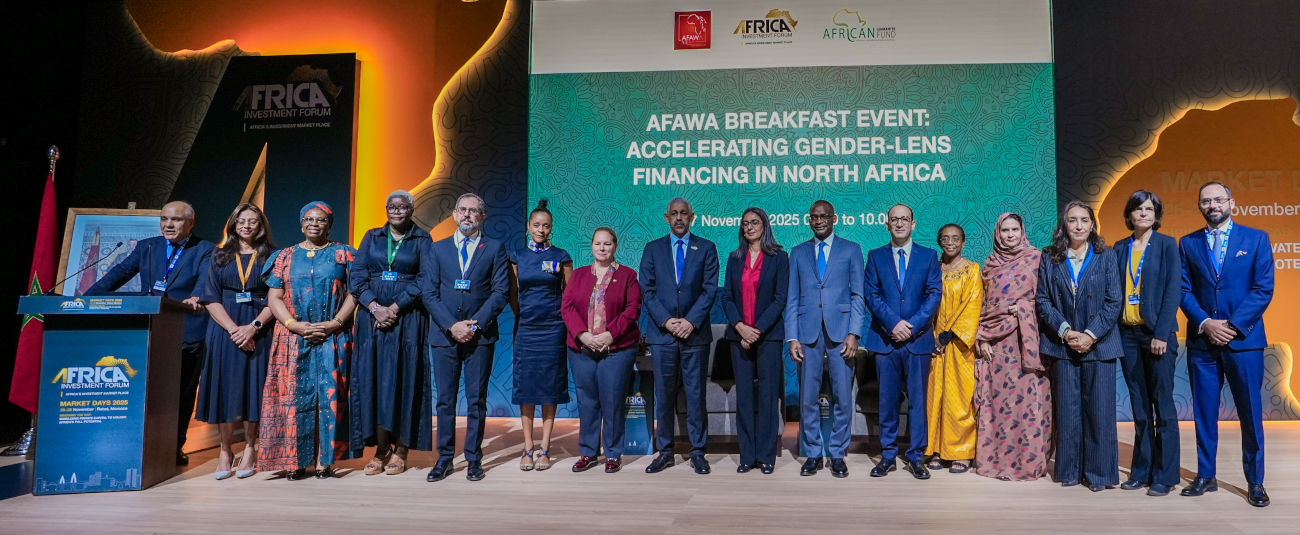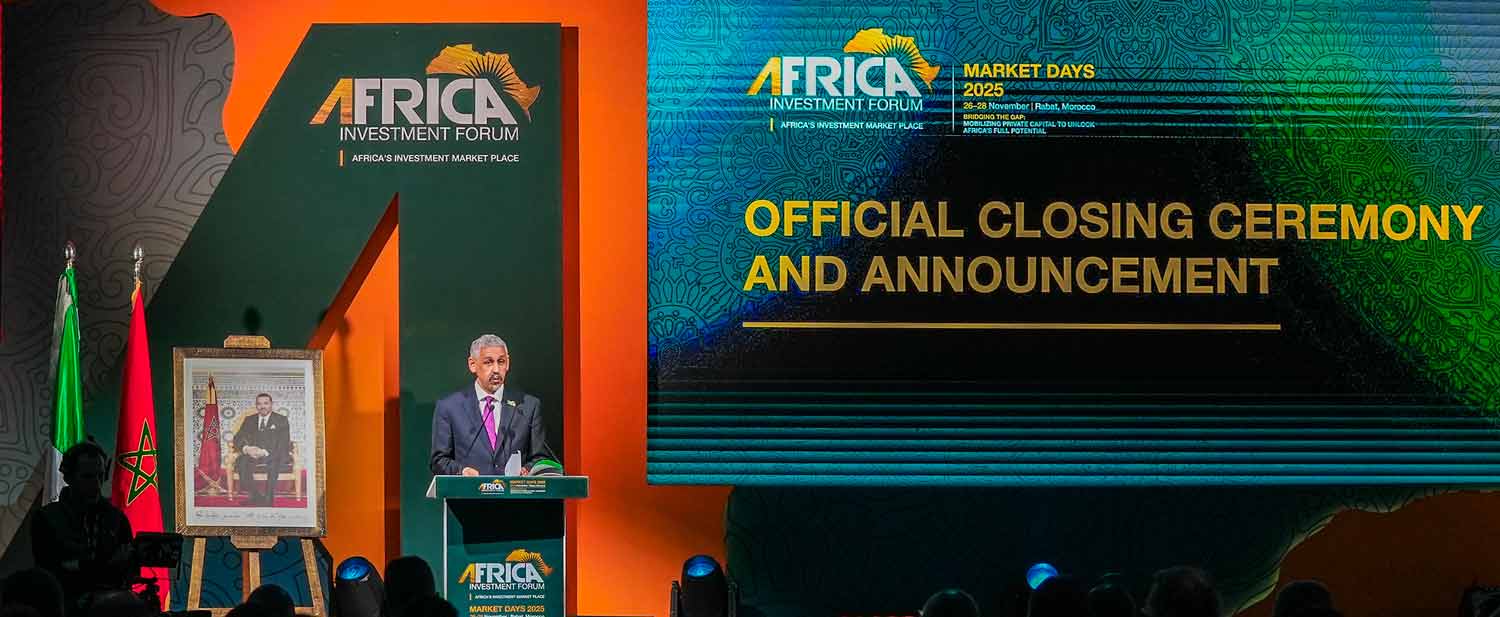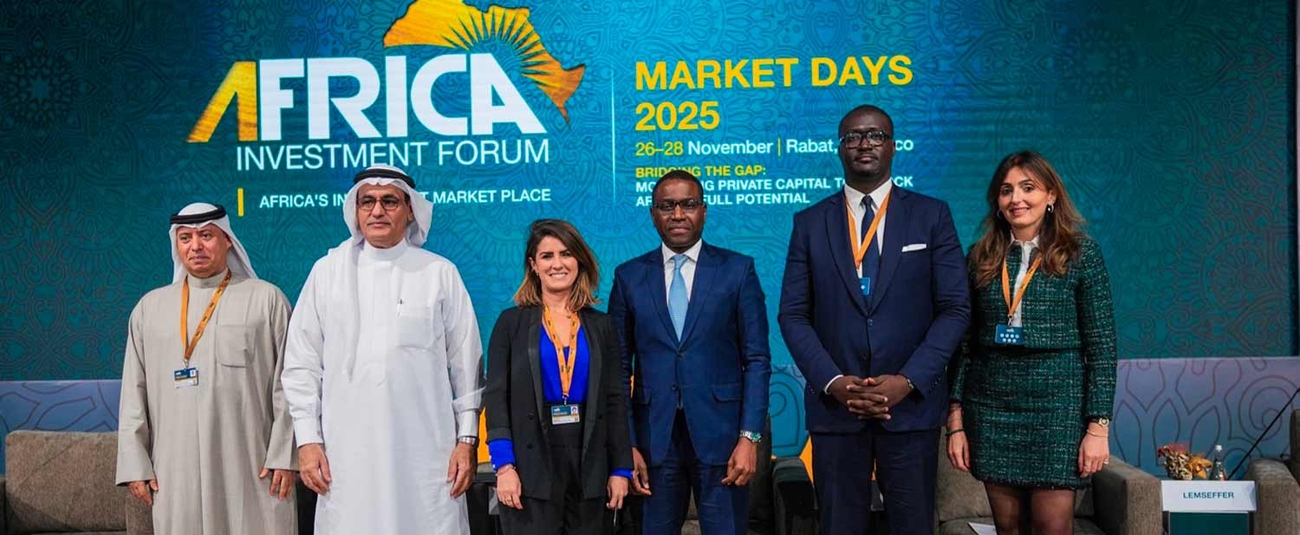- Japanese investment in Africa driven by both start-ups and major conglomerates.
Japanese companies are reaping lucrative returns from Africa’s enormous economic potential, African Development Bank President Dr. Akinwumi Adesina said in Marrakech as he called for expanded partnerships and greater investment to spur sustainable inclusive growth across the continent.
“Komatsu, the giant equipment company, generated revenue of $1 billion in 2020 in Africa,” Adesina said. “Mitsubishi Corporation and Hitachi have been investing in energy in Africa since the early 20th century. They know Africa well, and they have kept on investing.”
He was speaking during Boosting Africa’s growth with Japan: From Start-ups to Major Companies, a “Special Japan Room” session held on 9 November on the sidelines of the Africa Investment Forum 2023 Market Days.
It was attended by more than 80 representatives of 40 Japanese entities—startups, investment funds and major corporations and institutions—looking to Africa for opportunity. The African Development Bank’s Executive Director for Japan, Brazil, Argentina, Austria and Saudi Arabia, Takaaki Nomoto, accompanied the delegation. “Through strong public-private partnerships, faster growth of Japanese investments in Africa will occur,” Adesina said. “Africa needs more venture capital and private equity funds to tap into its huge potential,” Adesina said. “And Japan is paying attention.”
These successes have spurred a new generation of Japanese venture capital funds to focus on small and medium African startups, Adesina said. “The number of Japanese companies in Africa increased from 520 in 2010 to 900 in 2020.”

Healthcare drones and low-carbon ammonia for fertilizers
CEOs and principals in the Japanese delegation presented their investment funds and health, energy and infrastructure companies.
Ken Shibusawa, CEO of &Capital and Co-chairperson of the Global South Africa Committee of Keizai Doyukai, the Japan Association of Corporate Executives, said &Capital, a new Africa-focused impact fund endorsed by the Keizai Doyukai, had visited 90 companies in the last six months as it worked toward a first financial close projected to take place in the first quarter of 2024. Keizai Doyukai led by Ken Shibusawa signed a letter of intent with the African Development Bank to strengthen business ties between Japan and Africa during the 2022 Africa Investment Forum in Abidjan.
In his remarks, Shibusawa drew parallels between the development he was seeing in Africa and his own country’s industrialization. Japan was a developing country 150 years ago, Shibusawa said. With this legacy, Japan should co-create a bright future with Africa, he urged.
Susumu Tsubaki, the Managing Director of Tokyo-based AAIC also spoke. The company invests in African countries and provides consulting services to other companies active in the continent’s markets. Tsubaki described AAIC’s investment in the Smart Village Project, a 200-hectare macadamia nut plantation and processing business in Rwanda that employs about 350 local employees. AAIC financing has also improved the standard of living for 1,000 farmers on a 1760-hectare plantation in Tanzania while also providing infrastructure for electricity, wireless internet, and drinking water and healthcare to the community.
Another CEO, Yoichi Shimada of Connect Afya, previewed the company’s offering of medical equipment and testing labs for cancer, HIV and Covid-19 in Kenya, in partnership with major private hospitals and clinics. Regarding testing for these diseases, Shimada said that cancer survival rates in Africa are comparatively low owing to late diagnosis of the disease.
SORA Technology’s Director and Vice CEO Masaki Umeda showcased the company’s drone and AI-based solutions that aim to control malaria by targeting mosquito larvae in standing water. The company is also exploring deployment of drone-based solutions to other fields, such as cholera surveillance and efficient supply chains for medical supplies.

A representative of energy firm KENS.CO presented its investments in Burkina Faso, Burundi, DRC and other African countries. The company’s International Marketing and Business Development Manager Abu Zahed Azad described how it provides solar LED lamps to children that they can use at home to do their homework. The lamps, which can only be charged at school, are helping raise attendance and exam passing rates at schools in Benin and Burkina Faso.
Hiromi Suda, Africa marketing manager for Tsubame BHB, explained how the company’s cutting-edge innovation, developed at Tokyo Institute of Technology, is capable of producing ammonia at low temperature and low pressure for fertilizer and other uses. She said the Japan-based company was looking for partners in Africa to establish a special purpose company to produce and sell the green ammonia and low carbon fertilizer using renewable energy resources available in each country.
Principals of investment funds were also present, including Takuma Terakubo, CEO and General Partner of Uncovered Fund. He said the fund, with 29 African companies in its portfolio, had raised $454.3 million. Uncovered’s investments have generated 3300 jobs. It is targeting a portfolio of 1000 firms and the creation of 100 million jobs.
Terakubo said the company was moving ahead with new plans. “We are moving to the next step. We are creating a new fund. We have a new partner, Monex. He said that the new fund would create economic growth through open innovation.
“We are supporting the growth of the startup businesses in Africa with Japanese technology and assets,” Terakubo said. The new fund is also assisting African startups to issue carbon-neutral credits all over the world and to support trading between Japanese corporations and African start-ups. The new fund will focus on financial inclusion, distribution, mobility infrastructure and agriculture and energy.

In response to presentations, African Development Bank Vice President for Agriculture, Human and Social Development Dr Beth Dunford said, “What I heard today was passion and vision, which are the two things you really need to be successful, bolstered by very innovative technology, state of the art. What I did not expect is deep rooted African experience. All of you are coming from the ground with years, in some cases decades of experience in Africa, so those four things together really spell success.”
Mr. Tomonori Tatsumi, Chief Representative of Japan Bank for International Cooperation’s Representative Office in Paris, also attended the Japan session. He praised the efforts of Susumu Tsubaki and Takuma Terakubo “for incubating all the startups and SMEs to do business in African continent.
“Now that all these funds are in place, thanks to Shibusawa-san’s efforts to establish a new Japan-flagged fund to focus on the growth stage of the African business, it is time for the banking sector to consider we will be able to collaborate with those funds.” One approach would be for the fund to provide mezzanine equity with banks providing long term senior debt for a specific project. Another would be for the banks to provide merger and acquisition financing to Japanese investors to acquire African businesses.

African Development Bank Director for Energy Financial Solutions, Policy and Regulation Wale Shonibare, said: "I see the evolution in the way Japan is engaging with Africa. Since the 1970s, Japanese salary men and women have come to Africa and solely sold their products. However, now Japan is taking a different approach. They are collaborating with Africa, fostering innovation, and co-creating solutions on the ground. I believe this long-term strategy is not only sustainable but also mutually beneficial for Japan and Africa."
African Development Bank Vice President for Private Sector, Infrastructure and Industrialization Solomon Quaynor said, “What the Japanese companies bring is that focus on governance, the technical capability. I have to recognize Sumitomo as the kind of sponsor we want to work with because during very difficult times they really ante-ed up and supported the project, during really poor cycles and for those of us who provide finance and provide equity into private sector project, those are the kind of partners we want.”
Quaynor also spoke about synergies with Japanese partners to support startups. “The partnership with &Capital for us is because we saw that genuine interest in the early-stage companies—growth phase but still early stage—but we saw that this actually marries well with the youth entrepreneurship investment banks because we’re willing to come in at an earlier point to take more risk,” Quaynor said. &Capital is an impact investment fund founded in January 2023 that will channel Japanese financing into in early-growth stage start-ups in Africa.
The idea of Africa-Japan co-creating an investment ecosystem began at the 8th Tokyo International Conference on African Development (TICAD8), held in August 2022. During the meeting, Dr. Adesina emphasized the need for increased Japanese investment and operations in Africa. He followed this up with a meeting to Japan in April 2023 to engage with senior government and business leaders, entrepreneurs, and investors, on opportunities in Africa.
The African Development Bank’s Executive Director for Japan Takaaki Nomoto also affirmed the growing cooperation between Japan and Africa. He expressed optimism about Africa’s future owing to the ambition of its people, and the strong emphasis on private sector led development. “I am one of the optimists on Africa’s growth. The power and ownership of African people on social issues are very similar to those of Japanese people when we tried to modernize after the Meiji restoration in 1868 and when we made rapid growth after World War II,” he said.
The Special Japan Room was presented by a diverse group of startups and representatives of major Japanese companies. The startups included Mr. Kenta Hara, CEO/Founder of AA Health Dynamics, Ms. Ayako Kasai, CEO/Co-founder of Spiker, Mr. Kuniyuki Furuta, CEO of SOIK Corporation, Mr. Satoshi Akita, CEO of WASSHA Inc., Founder & CEO Mr. Koichi Sato and Africa Strategy Officer & Co-Founder Ms. Lina Robert of SUCRECUBE Japon Inc., Mr. Takuya Hirose, Technology Cooperation Manager for Steinmüller Engineering GmbH, and Ms. Airi Ikedo, Director and COO of Index Strategy, Inc. Additionally, representatives from major Japanese companies, such as Mr. Tadao Saida, Corporate Officer, Managing Director of Sumitomo Corporation Africa (Pty) Ltd, and Mr. Yusuke Yamamoto, Regional CEO for Africa and General Manager of Johannesburg Branch of Marubeni Corporation, also joined the presentation.
The Special Japan Room was co-chaired by Solomon Mugera, African Development Bank Director for Communication and External Relations, and Naoshige Kinoshita, Officer in Charge of Asia External Representation Office of African Development Bank.
The Africa Investment Forum, which ran from 8-10 November, drew African heads of government, investors, transaction sponsors and development financial institutions. It included boardroom sessions showcasing billions of dollars in agribusiness, transport and energy deals, among other critical sectors, to investors. To learn more about the Africa Investment Forum, click here.
